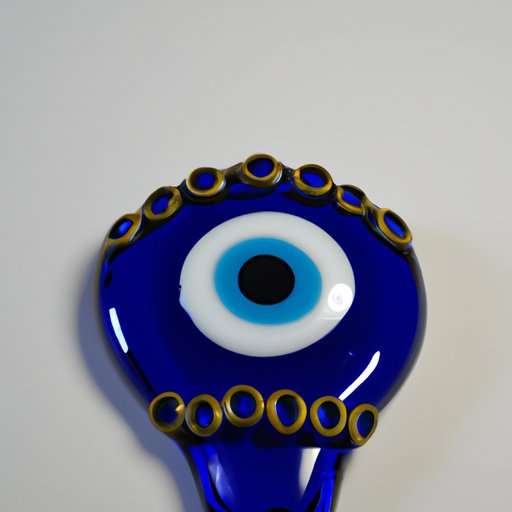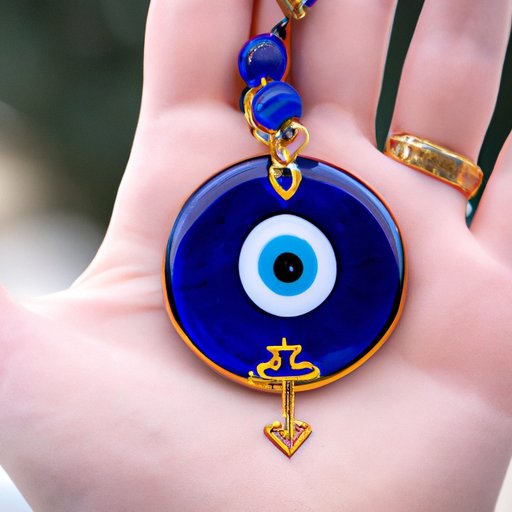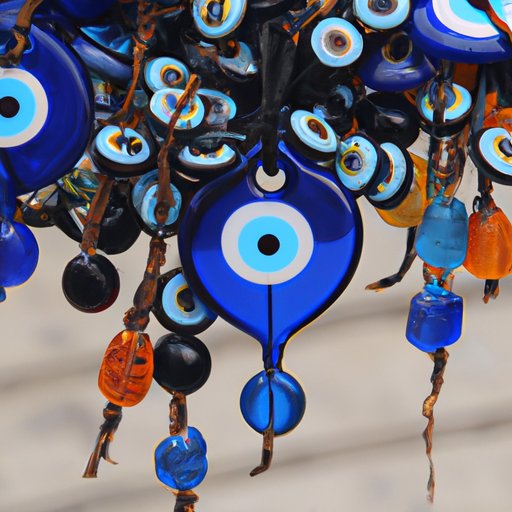Introduction
The concept of the “evil eye” has been around for centuries, and is found in many cultures across the globe. But what exactly is the evil eye, and why does it have such a powerful hold on people’s beliefs and superstitions? This article will explore the history and mythology of the evil eye, as well as examining how different cultures interpret its power. Finally, we will debunk some of the common misconceptions about the evil eye.
Exploring the History and Mythology of the Evil Eye
The evil eye is believed to be a curse that can be caused by someone who is envious or jealous of another person’s good fortune. It is thought to bring bad luck, illness, or even death. The belief in the evil eye dates back to ancient times, and is found in many cultures around the world, including Greek, Roman, Jewish, Islamic, and Christian traditions.
Examining Ancient Beliefs About the Evil Eye
In ancient Greece and Rome, the evil eye was believed to be a supernatural force that could cause harm. It was seen as a form of witchcraft and was feared by many. In ancient Greek mythology, the goddess Medusa was believed to have the power to turn anyone who looked upon her into stone with her gaze. This power was seen as a form of the evil eye.
Investigating Modern Practices Around the Evil Eye
Today, the belief in the evil eye is still prevalent in many cultures. It is believed that one can ward off the effects of the evil eye by wearing amulets or charms, or by using certain words or phrases. In some cultures, it is believed that if someone compliments you too much, they may be giving you the evil eye. To ward off this curse, it is common to say something like “May God protect me” or “Touch wood.”

Examining How Different Cultures Interpret the Evil Eye
The evil eye is seen differently in different cultures. Some believe it is an actual curse, while others see it as a superstition. There are also various practices associated with the evil eye, depending on the culture.
Analyzing Beliefs About the Power of the Evil Eye
In some cultures, the evil eye is believed to bring bad luck, illness, or even death. It is seen as an external force that can cause harm if not warded off. For example, in some Middle Eastern cultures, it is believed that one should never compliment another person too much, as this can attract the evil eye. In India, it is believed that one should never look directly at a baby, as this can bring bad luck.
Investigating the Superstitions of the Evil Eye
In some cultures, it is believed that certain objects, such as amulets or charms, can protect against the evil eye. These objects are often worn or carried as a way to ward off the curse. In other cultures, certain words or phrases are used to ward off the evil eye. For example, in some Latin American cultures, it is common to say “Agua bendita” (holy water) when complimenting someone to ward off the evil eye.

Debunking Common Misconceptions About the Evil Eye
Despite its prevalence in many cultures, there is little scientific evidence to support the belief in the evil eye. However, some studies have been conducted to investigate the impact of envy on people’s behavior and emotions.
Examining the Scientific Evidence Behind the Evil Eye
A study published in the journal Psychological Science found that envy can lead to negative outcomes, such as decreased self-esteem and increased aggression. The study concluded that envy can indeed influence people’s behavior and emotions, but it did not find any evidence to suggest that it could cause physical harm or bad luck.
Exploring the Role of Religion in the Evil Eye
Many religions, including Christianity, Islam, and Judaism, recognize the concept of the evil eye. In these religions, it is often seen as a spiritual attack or curse, rather than a physical one. For example, the Bible states that “thou shalt not suffer a witch to live” (Exodus 22:18). Similarly, in Islam, the Prophet Muhammad said that “the evil eye is real” and warned against its power.
Conclusion
The belief in the evil eye has been around for centuries, and is found in many cultures across the globe. While there is little scientific evidence to support the notion of the evil eye causing physical harm or bad luck, it is clear that envy can have an effect on people’s behavior and emotions. Moreover, many religions recognize the concept of the evil eye, viewing it as a spiritual attack or curse.
In conclusion, the evil eye is a powerful symbol in many cultures, and its significance is deeply rooted in history and mythology. Whether or not one believes in its power, it is clear that the belief in the evil eye is alive and well today.
(Note: Is this article not meeting your expectations? Do you have knowledge or insights to share? Unlock new opportunities and expand your reach by joining our authors team. Click Registration to join us and share your expertise with our readers.)
